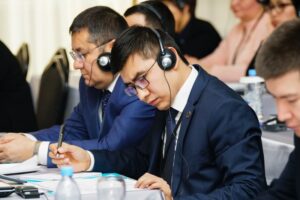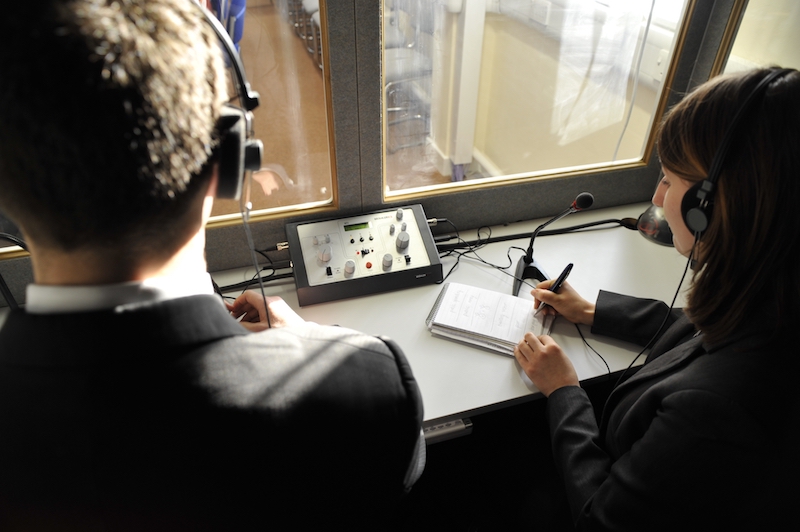It was in February 2008 when I was appointed to my first simultaneous interpretation at a meeting of EU members – the Council of Justice and Home Affairs. I have been working as a translator for the European Commission for a year now and managed to get some knack in this matter. I knew most of the terms, was well acquainted with the topics of the meetings, and felt quite well. But when I saw whom I had to translate, my frivolity disappeared without a trace: it was Jack Straw, and all translators are in awe of him. Straw, then UK’s Attorney General, is a pretentious orator: speaks quickly and sometimes strays from topic. I knew about this from my colleagues. A lump rose up in my throat.
The meeting began at ten o’clock. At the place I was already at nine. At breakfast I wondered at my calmness at home. And then he noticed that my palms were wet with cold sweat. Everything seemed significant and important. The security measures were somewhat more serious than usual. I passed the check not only at the entrance – representatives of the security service were also standing directly in front of the meeting room. TV and photo reporters filmed the arriving ministers. Reports from Council of Ministers meetings are often broadcast on the evening news. The press is allowed only before the meeting and at the final press conference; the meeting itself is held without journalists. We, translators, are always glad if our presence remains unnoticed by anyone. Our booths are located against the walls of the meeting rooms, ministers sit in the center. The glasses of the booths are lightly mirrored. We see everyone, but we – no one. As a specialist in simultaneous translation, I can only notice my mistake directly at the council meeting. Therefore, I do everything to remain unnoticed.
I was in the same elegant suit as everyone else that day, yet I felt ill at ease. Others: journalists, ministers, my colleagues – gave the impression of absolute calm, as if everything were completely ordinary. For me, everything was new. I went to my booth. There was already a thick folder with cases that were to be considered at the meeting. I knew most of the texts in this folder almost by heart. In the end, the last few days, all I did was study the topics and cram the vocabulary. However, some documents were completely unfamiliar to me. In contrast to the usual working group meetings at ministerial meetings, many documents are highly classified and intended exclusively for council meetings. Therefore, we, the simultaneous interpreters, receive them immediately before the meeting and must return them immediately at the end of the meeting.
I turned on my laptop and asked for agenda items, opened a list of terms and dictionaries. I quickly ran through the main vocabulary and some stereotyped legal expressions. I must know them firmly, otherwise, during the discussion, I will fall into a stupor. Through the glass I saw Jack Straw take his seat. He looked calm. My heart was beating. I was constantly wiping my palms on my pants. “Just think,” it was spinning in my head, “now I will translate the UK Justice Minister!”
Even while studying in Leipzig, I occasionally worked as an interpreter in a small publishing house and on university radio. Brussels, the European Union conferences – it was all so far away from me, I only saw it on TV. It seemed to me that interpretation is even more difficult than many people think. It is not enough just to understand individual words. It is also necessary to convey the position of the speaker and his mood. Is he dissatisfied or aggressive? Sarcastic or reasonable? Want to sound witty? The responsibility that we have as translators is enormous. If this or that politician is misunderstood, we will very quickly be declared guilty.
The meeting began. I put on my headphones and turned on the microphone. Now I don’t remember exactly what happened in the next half hour. I listened attentively, took notes, wrote down the translation on paper. When, after a pause, I sat down again in the booth, the floor was given to Jack Straw. With trembling hands, I quickly called up the English vocabulary on my laptop. Straw was telling a joke. I translated it pretty well, – and then a word flashed that I did not understand. I could not recognize it even from the context. What was I supposed to say? The ministers who were present in the hall, in no case should have noticed my confusion. I was speechless, turned off the microphone and looked inquiringly at my colleagues. My face was on fire. Now what? One of my colleagues wrote something on a piece of paper and handed it to me. I did not understand the English word gallows, which means gallows. Turning on the microphone again, I finished the sentence. All this happened in a split second. The meeting was almost halted.
It all ended at exactly 18.00. My tension has completely eased. In the evening at home, lying on the couch, I watched the heute-journal, where the council meeting was reported. The camera circled over the heads of the ministers in the conference room. Despite the fact that I was not visible, I thought with some pride: “I took part in this.”




